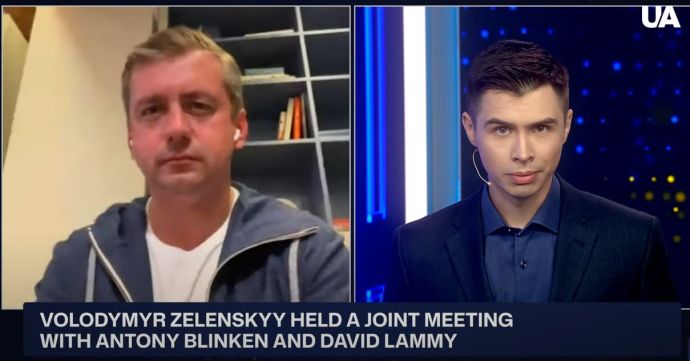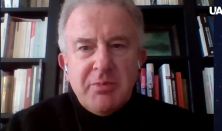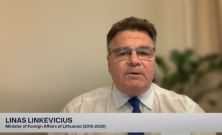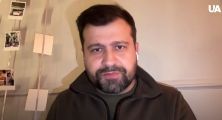Zelenskyy held a joint meeting with U.S. Secretary of State Antony Blinken and UK Foreign Secretary David Lammy, who visited Ukraine. The president emphasized the importance of this signal of steady and strong support for Ukraine from key partners and praised the personal involvement of high-ranking U.S. and UK officials at the Fourth Summit of the International Crimea Platform.
Zelenskyy also informed them about the situation on the front line and outlined the priority needs of Ukraine’s defense forces. He stressed the importance of Ukraine receiving permission to use long-range weapons provided by the U.S. and other partners as soon as possible.
These topics were discussed with Taras Semeniuk, an expert in international relations.
— The fact that Volodymyr Zelenskyy met with Antony Blinken and UK Foreign Secretary David Lammy at the same time—what does this indicate about our current situation?
— I think this is a very strong sign of unity among the leadership of the Anglo-Saxon countries, and it’s the first time both the U.S. and the UK have had representatives together in Ukraine. This is a powerful message to Russia, and also to Russia’s allies, who are helping by providing ballistic missiles.
The key message is that Ukraine is not alone—the U.S. and UK stand firmly in support.
Additionally, this meeting coincided with the Crimea Platform summit held in Kyiv. Russia constantly tries to downplay the importance of the Crimea Platform, but now we see that not only did the U.S. and UK participate, but also leaders from the European Union. This shows that the Crimea Platform is a serious strategic forum to keep alive the goal of returning Crimea to Ukraine and to highlight the plight of the Crimean Tatars, the indigenous people of the region.
It also underscores the ongoing discussions about long-range missiles. Ukraine is waiting for the U.S. to approve the use of these missiles, particularly to target Russian military bases. This would represent a significant crossing of one of Putin’s “red lines.”
— What does this imply, and why is there hesitation in granting these long-range missiles?
— Our partners, especially the U.S., are cautious about escalating the conflict. They are concerned that providing long-range missiles could push the war into a full-scale conflict, involving NATO directly, which they want to avoid. This kind of decision takes time, as it involves weighing the risks of escalation, including the possibility of Russia using nuclear weapons in response.
However, I think we are close to an agreement. We’ve been waiting for this decision, and there is a strong possibility that Antony Blinken or British Prime Minister Keir Starmer might announce it soon. This Friday, September 13, President Biden is set to meet with Starmer, and one of the topics will likely be this very decision about allowing Ukraine to strike deep into Russian territory with Storm Shadow and ATACMS missiles.
— Why is this decision taking so long, especially considering that Blinken said Iran has already supplied Russia with ballistic missiles?
— The fact that Iran has provided ballistic missiles to Russia sends two clear messages. First, Russia’s own stockpile of ballistic missiles is dwindling, which is why it’s seeking support from allies like Iran. Second, Iran’s involvement is now out in the open, and this could escalate the conflict even further.
North Korea is also aligning with Russia, and while China remains officially neutral, it’s providing key components for missile production. Russia cannot produce these on its own, so it needs allies.
This is another significant escalation in the war, and if the U.S. and its allies want to balance this, they must respond in kind by supplying Ukraine with equivalent weapons.
— So, you’re suggesting that if Iran is providing missiles, Ukraine should receive similar weapons to maintain a balance?
— Yes, exactly. If Ukraine receives long-range missiles, it would be a way to maintain military balance. Russia understands that these missiles pose a serious threat to its territory, and this could push the conflict to its final stage—either moving toward peace negotiations or further escalation, perhaps involving tactical nuclear weapons.
Our Western allies are likely considering this scenario. They would not provide long-range missiles to Ukraine without being fully prepared for how to respond if Russia escalates by using nuclear weapons. This is why the decision is taking time—it’s the final step in a dangerous escalation process.
— So, do you see this as the final stage before either peace negotiations or an escalation toward nuclear conflict?
— Yes, it could go either way. After crossing this “red line,” we may either move toward Ukraine’s victory or push the conflict to the brink of nuclear escalation. Zelenskyy has already presented his plan for Ukrainian victory to President Biden, and it will also be presented to both U.S. presidential candidates—Donald Trump and Kamala Harris—because one of them will take office this autumn.
— Why is it important that Ukraine’s victory plan is being discussed with Western leaders, including future U.S. presidents?
— It’s crucial because we need to understand what “victory” means to our Western partners. For Ukrainians, victory is clear: it means regaining all occupied territories and having full control over our land. But our allies might interpret victory differently. Some might see it as freezing the current front lines, rather than fully liberating all of Ukraine, including Crimea.
For example, Kamala Harris, in her presidential platform, discusses Ukraine’s sovereignty, but not specifically about returning all territories to Ukraine’s 1991 borders. “Sovereignty” is more of a political term, meaning the country exists and is recognized, but it might imply a longer timeline before Ukraine regains full control over its occupied territories.
This difference in understanding victory could shape how the war ends, and that’s why it’s important to clarify what our allies mean when they talk about Ukrainian victory.
Read also: Iranian missiles have been supplied to Russia. Interview with Frank Ledwidge










